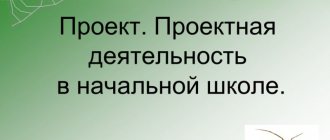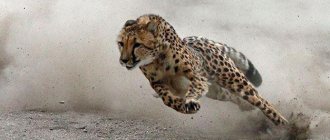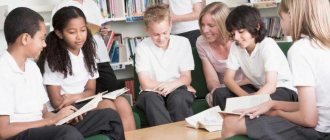Kindergarten project on physical education
Project at the preschool educational institution “Towards records”
Project direction: “Physical education” Educational areas: “Health”, “Physical education”. We are building the future boldly, We are striding towards the goal like athletes! We certainly will not go astray - We will return the health of the nation! Russia's future is children, more valuable to us than anything else in the world. In order to lay a strong foundation, we must revive traditions. Relevance of the project: The revival of the GTO complex in educational organizations, today, in my opinion, is relevant and fundamental. The purpose of the introduced complex is to further increase the level of physical education and readiness of people, primarily the younger generation, for work and defense. This is exactly how the foundation for the country’s future achievements in defense was laid earlier and will now be laid. Being a unique physical education program, the GTO complex should become fundamental in a unified system of patriotic education of the younger generation. As if to confirm the social significance and relevance of this project, I would like to note that all people are different. However, everyone who voluntarily decides to undergo the GTO test has one thing in common - determination. It is this trait that is most important for people of the 21st century. Only purposeful and physically prepared people will be able to succeed in a competitive labor market, and our task is to help them in this, because their achievements will have not just personal, but social meaning. It is in preschool age that the foundation is laid for the physical development, health and character of a person in the future. This period of childhood is characterized by gradual improvement of all functions of the child’s body. A child of this age is extremely flexible. All this gave me the idea of creating a project to implement the GTO complex. Problem: lack of awareness among parents about the importance of physical education. Low sports activity, sedentary lifestyle of children and their families, lack of understanding of culture. Negative statistics on family lifestyle (reduced activity, unbalanced diet, non-compliance with the daily routine, growing risk factors, lack of healthy habits). The goal of the project: to make the work on physical education of preschool children systematic and effective. Project objectives: 1. To acquaint children with the GTO program and the tradition of their implementation; 2. Expand and consolidate the knowledge of children and parents about a healthy lifestyle; 3. Continue to develop motor skills and physical qualities of children; 4. Improve physical abilities in joint motor activities of children; 5. Promote the development of interest in physical education and; 6. Improve the professional skills of preschool teachers on the topic “healthy lifestyle”; 7. Create a unified educational space based on trusting partnerships between preschool employees and parents. The novelty of the project: the creation in a preschool institution of a system for preparing for testing (tests) of the All-Russian physical education and sports complex GTO. Joint activities of a preschool institution, MBOU Youth Sports School and family with the aim of introducing the child to a healthy lifestyle and enriching his social experience. Type of project: educational - recreational. Project participants: preschoolers 6-7 years old, physical education instructor, teachers, music director, parents, director of the MBOU Youth Sports School, coaches - teachers of the MBOU Youth Sports School. Project partners: MBOU Youth Sports School. Project duration: Long-term. The main forms of project implementation: conversations, children's creativity, games, quizzes, competitions, excursions, entertainment. Project implementation period: From 1.09.2017 to 1.07.2018. Integration of educational areas: “Cognitive development”, “Speech development”, “Artistic and aesthetic development”, “Physical development”, “Social and communicative development”. Forms of work: Playful, educational, creative. Expected results: 1. identification of the physical and psychological predisposition of a preschooler to any sport; 2. replenishment of knowledge about the GTO complex. 3. increasing motivation and interest in physical education and sports; 4. positive performance in passing the GTO standards; 5. growth in sports achievements;5. emotional rapprochement between children and parents; 6. growth of professional competence of teachers; 7. active interaction between parents and teachers; 8. enriching the teaching experience of parents; 9. parents’ awareness of their needs for systematic physical education and sports, maintaining a healthy lifestyle; 10. enrichment of the methodological base and developmental environment in preschool educational institutions; 11. gaining experience in interacting with social partners; 12. increasing the attractiveness of the kindergarten in the eyes of parents and colleagues. Conditions for the implementation of the project: For the successful implementation of the “Towards Records” project, the Parabel Gymnasium has a personnel potential: physical education instructor, educators, medical worker, speech therapist, psychologist, music director. Favorable conditions have been created: a sports ground has been prepared, the necessary sports equipment has been purchased, a comfortable spatial environment has been created in groups, physical activity centers have been created in all age groups.
Methodological and fiction literature was also purchased. Regulatory and legal regulation and regulatory framework for the implementation of the project The regulatory and legal framework of the project is built on the basis of legislative and program documents at the federal, regional and municipal levels. The most significant documents defining the conditions and mechanisms for introducing the educational component model at the federal level include: 1. The Constitution of the Russian Federation (adopted by popular vote on December 12, 1993) (taking into account amendments made by the Laws of the Russian Federation on Amendments to the Constitution of the Russian Federation dated December 30, 2008 N 6-FKZ, dated December 30, 2008 N 7-FKZ). 2. Decree of the President of the Russian Federation dated March 24, 2014 No. 172 “On the All-Russian physical culture and sports complex “Ready for Labor and Defense” (GTO).” 3. Draft Decree of the Government of the Russian Federation of 2014. “On approval of 4. Regulations on the All-Russian physical culture and sports complex “Ready for Labor and Defense” and (GTO).” 5. State program of the Russian Federation “Development of Education” for 2013-2020, approved by Order of the Government of the Russian Federation of November 22, 2012 No. 2148. Project roadmap
Organizational and pedagogical work: 1 Diagnosis of the level of physical fitness of children. September 2017 – May 2020. Responsible: FC instructor. 2 Analysis of conditions for project implementation. September 2020. Responsible: Manager, working group. 3 Selection of methodological, popular science literature, illustrative material on the topic of the project. Constantly. Responsible: Teachers, senior teacher, physical education instructor, music director. 4 Drawing up an action plan. September - October 2020. Responsible: Physical education instructor, senior teacher, educators, director of the MBOU Youth Sports School. 5 Familiarization and study of the test standards of the All-Russian physical culture and sports complex “Ready for Labor and Defense” (GTO) Stage I (age group from 6 to 8 years); November 2017. Responsible: Physical education instructor. 6 Presentation using multimedia equipment “History of the GTO”; November 2020. Responsible: Physical education instructor, senior teacher. 7 Selection of equipment, sports equipment for conducting regulatory tests, physical education classes and sports events. October-November 2020. Responsible: Head, physical education instructor. 8 Presentation for children and parents using multimedia equipment “Complying with GTO standards.” May 2020. Responsible: Physical education instructor, teachers. 9 Presentation of the project and creation of methodological recommendations for teachers of other preschool educational institutions. June 2020. Responsible: Physical education instructor. 10 Photo report on the kindergarten’s website on the events carried out within the framework of the project. June 2020. Responsible: Physical education instructor, senior teacher. 11 Compiling a collection of poems and riddles about different sports. April-May 2020. Responsible: Physical education instructor, teachers. 12 Analysis of monitoring of work on the “Towards Records” project. June 2020. Responsible: Physical education instructor. 13 Selection of musical repertoire, production of new attributes, preparation and decoration of the hall for sports events. September-October 2020. Responsible: Music director, physical education instructor. 14 Development of a scenario for the sports festival “TRP is our faithful friend.” April 2020. Responsible: Physical education instructor. 15 Stand “TRP – let’s revive traditions!” October 2020. Responsible: Physical education instructor. 16 Exhibition of joint creativity of children and parents “From GTO standards to Olympic medals!” February 2020. Responsible: Teachers, senior teacher. 17 Photo exhibition “Towards records”. March 2020. Responsible: Teachers, senior teacher. 18 Workshop for teachers: “The physical culture and educational space of a preschool institution as a condition for preparing children for passing the standards of the GTO complex.” October 2020. Responsible: Physical education instructor. 19 Consultation for teachers: “What is GTO?” December 2020. Responsible: Physical education instructor. 20 Consultation for parents: “Why is GTO necessary in preschool age? January 2020. Responsible: Physical education instructor. 21 Consultation for teachers: “Introduction of the GTO complex in preschool educational institutions. March 2020. Responsible: Physical education instructor. 22 Consultation for parents: “Regulatory GTO tests and how to pass them.” April 2020. Responsible: Physical education instructor. Integrated sports and recreational activities for children. 24 Excursion to the MBOU Youth Sports School. October 2020. Responsible: Director of the Youth Sports School, physical education instructor. 25 Meeting the best athletes of the Youth Sports School. January 2020. Responsible: Director of the Youth Sports School, physical education instructor. 26 Passing the GTO standards at the Youth Sports School. May 2020. Responsible: Director of the Youth Sports School, Youth Sports School trainers, Physical education instructor. 27 Carrying out the sports festival “TRP is our faithful friend”. June 2020. Responsible: Physical education instructor, teachers. Activities with parents. 28 Joint event “Mom, Dad, I – a sports family.” October 2020. Responsible: Physical education instructor. 29 Master class “Do as I do!” for children of the preparatory group for school and their parents according to different types of GTO standards (strength, flexibility, speed and endurance). May 2020. Responsible: Physical education instructor, teachers. Work with children. 30 Games - exercises with the inclusion of mandatory tests (tests) of the All-Russian Sports Society "GTO". During a year. Responsible: Physical education instructor. 31 Examination with children of illustrations, photos and video materials on the topic of the project. During a year. Responsible: Teachers, physical education instructor. 32 Reading stories with children, asking riddles, learning poems about sports. During a year. Responsible: Educators. 33 Carrying out intellectual and educational games with children: “Find out the sport”, “Sports equipment”, “Fold the picture”, “Find an athlete by description”, “What has changed in the sports arena?” During a year. Responsible: Physical education instructor, teachers. 34 Drawing on the topic: “Let’s fulfill the GTO standards!”, “Sports and sports attributes”; "Forward to victories." During a year. Responsible: Educators. Literature 1. Materials of the official website of the All-Russian Sports Society "GTO"; 2. Decree of the President of the Russian Federation dated March 24, 2014 No. 172 on the All-Russian physical culture and sports complex “Ready for Labor and Defense” (GTO); 3. Regulations on the All-Russian Physical Culture and Sports Complex “Ready for Labor and Defense” (GTO) dated June 11, 2014 No. 540; 4. Veraksa N. E., Veraksa A. N. Project activities of preschoolers. A manual for teachers of preschool institutions. – M.: MOSAIKA-SYNTHEZ, 2008; 5. Kartushina M. Yu. We want to be healthy: health-improving and educational activities for children of the preparatory group. – M.:ARKTI, 2004; Penzulaeva L.I. – physical education classes in kindergarten. Preparatory kindergarten group for school. Lesson notes. – M.: MOSAIC – SYNTHESIS, 2011. – 112 p. 6. Penzulaeva L.I. – Health-improving gymnastics for children 3-7 years old. Health-improving gymnastics complexes. – M.: MOSAIC – SYNTHESIS, 2010. – 128 p. 7. Frolov V.G. – Physical education activities, games and exercises during walks: A manual for educators. – M.: Education, 1986. – 159 p. 8. Kharchenko T.E. – Morning exercises in kindergarten. Exercises for children 2-3 years old. – M.: MOSAIC – SYNTHESIS, 2009 – 88 p. 9. Shebeko V.N. – Physical education holidays in kindergarten: creativity in the motor activity of a preschooler: Book. for kindergarten teachers / V.N. Shebeko, N.N. Ermak. – 3rd ed. – M.: Enlightenment. 2003. – 93 p. 10. Shishkina V.A. Movement: Book. for a kindergarten teacher. – M.: Education, 1992. – 96 p.
We recommend watching:
Family - creative project for kindergarten Short-term project in the middle group. Rules of conduct Project for kindergarten. Middle - senior group Short-term project in the 2nd junior group. Wintering birds
Similar articles:
The role of folklore in the physical education of preschool children
Morning exercises in the second junior group in a playful way
Morning exercises in kindergarten in the preparatory group
Project on physical development for children in the preparatory group for school.
Physical development project for children
preparatory school group.
Prepared by teacher Ovodova A.A.
Topic: “Sports games as a means of increasing interest in physical education among children of senior preschool age”
Type of project: practice-oriented.
By subject area: educational area: “Physical development.”
By duration: medium duration (2 months)
By number of participants: group.
Project participants: group students, teachers, physical education instructor, parents of students.
Relevance of the project
In the educational field of preschool education “Physical Development”, the main task is the harmonious development of physical and mental health among students.
The educational area “Physical development” should be aimed mainly at achieving the most important goal - the formation of ideas in preschoolers about a healthy lifestyle. The most important role in the physical education of a child belongs to educators and physical education instructors. Their ability to methodically correctly organize and conduct classes, non-standard approaches to the choice of forms and means of conducting them are the most important components of developing the necessary habits, motor skills and abilities in a child.
Purposefully selected outdoor games, relay races, game tasks, attraction games, games with recitation and counting, and simulation games develop fine motor skills, coordination of movements, balance, accuracy, improve the quality of sound pronunciation, and help master mathematical concepts, i.e. stimulate the development of physical, psychomotor and intellectual abilities of children.
Games with sports elements are distinguished by a wide variety of interactions between sensory systems of various modalities, which is also the most important factor in improving the organization of movements. Compared to outdoor games, games with sports elements are a more complex form of activity.
Only the joint activities of teachers, parents and children can produce significant results. In the course of joint activities with children, the teacher, collaborating with the family, ensures the preschooler’s ascent to a culture of health.
Work on the health and physical education of children should be built on the basis of the leading activity of preschool children - play, and motor play activity is the basis for the education, health, development and training of preschool children (Trubaychuk L.V.).
Only through the use of play activities and a properly formed system of physical education and health work can a reduction in the level of morbidity in children be achieved.
Objective of the project —
creating conditions for physical activity of children through outdoor games, with elements of sports games.
Project objectives:
1. Promote the physical development of children through the use of various sports games in various types of joint and independent activities of children
2. Increase children’s physical activity through outdoor games.
3. Maintain children's interest in physical exercise and sports.
4. To interest and involve parents in organizing work with children to improve their children’s motor skills.
5. Develop information material for parents with recommendations: to familiarize themselves with the physical characteristics of the development of children in the preparatory group for school.
Project products:
- A plan for the physical development of children, through the use of various sports games for children in the preparatory group for school, drawn up taking into account the requirements of the Federal State Educational Standard for Education;
- Consultations and recommendations for parents;
- Methodological recommendations for educators;
- Card index of outdoor games, with elements of sports games.
Expected Result:
— formed awareness of the need to maintain a healthy lifestyle;
— reducing morbidity and increasing the level of health of children;
— increasing the level of physical fitness; — active assistance and interest of parents in organizing work to improve the health of children
Principles that determine the features of organizing the process of training and education
(Preschool pedagogy with the basics of education and training methods // Edited by A.G. Gogoberidze, O.V. Solntseva)
- The principle of educational and developmental orientation
- The principle of systematicity and consistency and strength of the material mastered in the learning process
- The principle of activity and independence
- The principle of taking into account the age and individual characteristics of children
- The principle of interaction and cooperation between teachers and parents of students
Project implementation stages
Stage I. Preparatory stage
— creating the necessary conditions for the implementation of the project: — selection of educational and fiction literature — conducting conversations — preparing attributes for sports games and activities
List of literature to study
1. Voloshina L.N., Kurilova T.V. Games with elements of sports for children 6 - 7 years old.
2. Preschool pedagogy with the basics of methods of education and training: Textbook for universities. Third generation standard / Ed. A. Gogoberidze, O. V. Solntseva. – St. Petersburg: Peter, 2014. – p. 197 – 202
3. Nikanorova T. S., E. M. Sergienko “Healthy” health improvement system for preschool children 2007 4. Podolskaya E.I. “Forms of health improvement for children aged 4-7 years” 2009 5. The “Play for Health” program and the technology of its application in preschool educational institutions. – M.: Publishing house “GNOM and D”, 2004.
Stage II. Developing an action plan to achieve the goal
Questioning parents
“Determination of the level of knowledge about a healthy lifestyle” (Appendix 2)
To identify parents’ level of knowledge about a healthy lifestyle”
Educators
Speech at a parent meeting
To interest parents in spending joint leisure time with their children on the topic.
Physical education instructor, teachers
Consultation for parents “It’s good to be healthy”
Introduce parents to a set of hardening activities
Educators
Conversation:
“Conversation about health, cleanliness”, solving provocative questions and problematic situations
Formation of cultural and hygienic skills
Educators
Spend Health Day with your children
involve parents in organizing work with children to improve their children’s motor skills
Physical education instructor, teachers
October
Watching cartoons with children “How animals played football”, “How a duckling musician became a football player”, “An extraordinary match”, “Smeshariki”
Encourage children to be agile and move a lot.
Educators
Didactic games “Sports Lotto”, “What did the artist mix up?” Tabletop
Football game
Design an exhibition of wall newspapers “Healthy Lifestyle”
Design an exhibition of children's drawings “Types of Sports”
Introduce children to board games about sports.
Physical education instructor. Educators
Hold a sports festival “Dad, Mom, Me – a Sports Family”
involve parents in organizing work with children to improve their children’s motor skills
Physical education instructor. Educators
Stage III. Basic (practical)
The Federal State Educational Standard for Preschool Education identifies a number of important principles that the preschool program must comply with. One of them is the principle of integration of educational areas in accordance with their capabilities and specifics.
A set of didactic games (“Place them in order”, “Find a pair”, “Sports dominoes”, “Good and bad”, “Sports in winter and summer”)
Role-playing games “Sports School”, “Olympic Games”
Board games (“Spartakiad”, “Checkers”, “Who is faster?”)
Competition games “Who is faster”, “The most dexterous”, “We are athletes”.
Card index of folk outdoor games “Grandma’s Chest of Games”
Cognitive
development
- Looking at illustrations
- Book exhibition
- Album design
- A series of conversations “Great athletes”, “Strength and health”, “We are friends with physical education”, “Proper nutrition”, “Hardening”, “Personal hygiene”
- GCD on the topic “Optimal motor mode, its dosage and benefits”
Speech
development
- Learning riddles, poems, physical education lessons, finger games, proverbs in class and in free activities (Appendix 5)
2. GCD for speech development on the topic: “Such different balls”
Reading fiction
- Reading and discussion of fiction on the topic
- Memorizing poetry
Artistic
creation
1.Organization of an exhibition of drawings “We are friends with sports”
2. Modeling “1,2,3-sports figure, freeze!”
3. Collage “Olympic flame”
Musical development
- Learning songs, dances, listening to audio recordings
Using rhythmic movements accompanied by music
Physical development
1.Learning physical exercises, outdoor games, breathing and finger exercises
2. Making cards, diagrams with a variety of movements, their purpose (Appendix 3)
3. Various types of massage, using non-traditional sports equipment
Working with parents
- Parent meeting “We are participating in the project “If you want to be healthy!” (Appendix No. 1)
- Photo exhibition for parents
- Individual conversations about the physical qualities and skills of each child, about the importance of joint motor activity
Stage IV. Summarizing
Project results:
Subject development environment
The content of the subject-developmental environment in the preschool allows organizing independent motor activity in such a way that it ensures harmonious development for each child, helps him use the reserves of his body to preserve, strengthen and improve his level of health, enrich motor experience, increase creative and cognitive potential; introduce children to physical education and a healthy lifestyle.
- During the project, conditions were created to ensure the effective use of sports equipment, non-standard equipment was tested: “Fun Tracks”; "Motalochki"; "Sultans".
- In children, the incidence rate has decreased;
- Parents received methodological recommendations, information material with recommendations: on familiarizing themselves with the physical characteristics of the development of children in the preparatory group for school.



